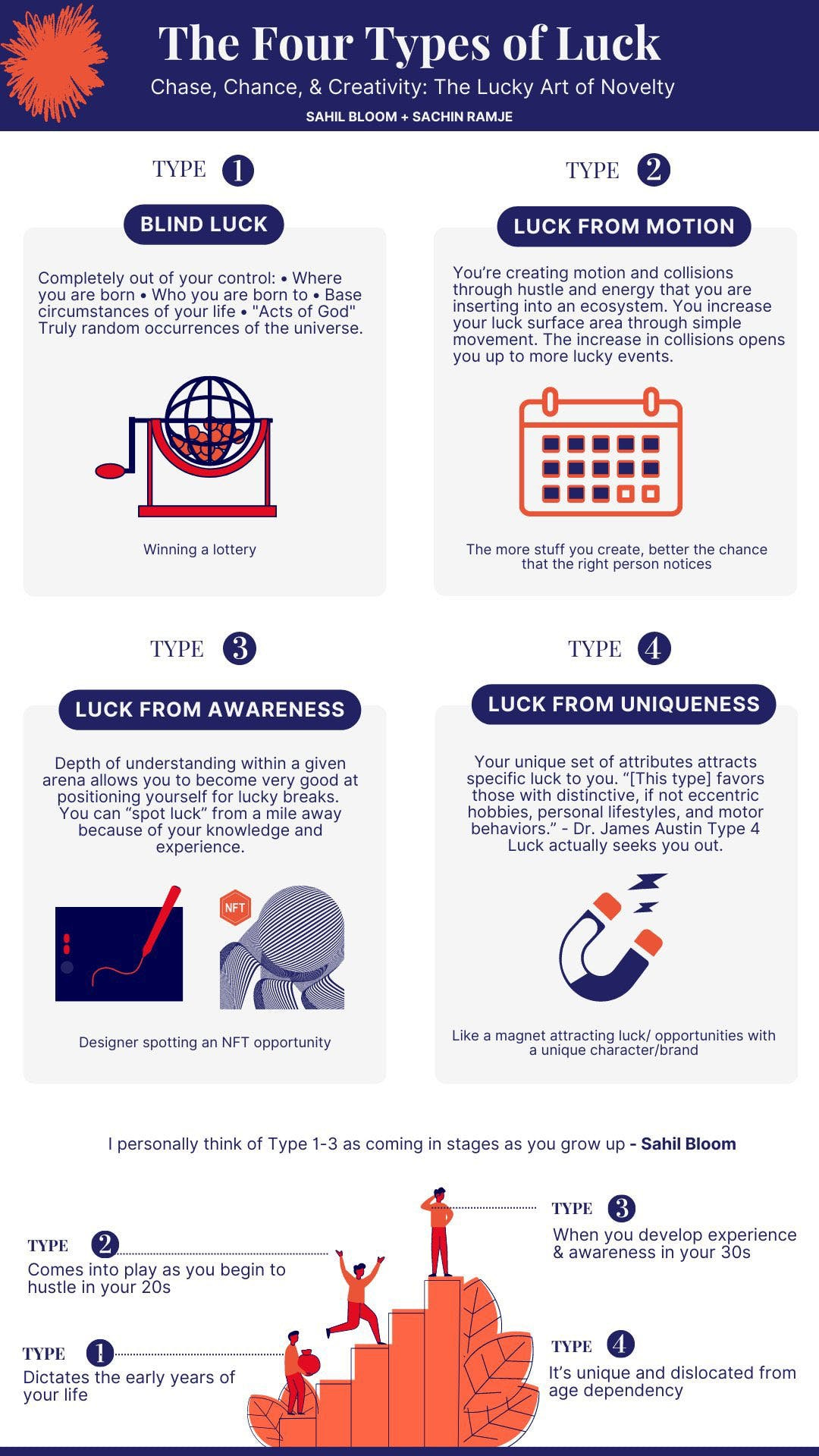"The dog that trots about finds a bone” - Golda Meir
In his book Chase, Chance, and Creativity, Dr. James Austin outlines the four different types of luck or chance as he refers to it.
His theory confirms something that I explored in another article. The fact is: we can manufacture luck based on our outlook, life choices, and past experiences.
Of the four types explained by Dr. Austin, three can be engineered and optimized for.
This is the whole purpose behind “Serendipity Lab”. In this lab, we experiment and discover ways to increase the amount of Serendipity and Luck in our lives.
Chance I: Blind luck
Chance I is the default luck most people think of.
There is no skill involved and you can’t influence it. It’s accidental.
You happened to be in the right place at the right time.
You can think of Blind Luck as cards we draw in the game of life. Some people are fortunate to get a good hand right from the start. But the key is to know how to play these cards well.
Case in point: Lottery winners. Whether they win $500 million or $1 million, about 70 percent lose or spend all that money in five years or less.
Chance II: Motion
Chance II luck comes from activity. It’s when motion is involved.
It favors those who have a persistent curiosity about many things, coupled with a willingness to experiment and explore.
Often this is an iterative process. Thomas Edison tried 1,000+ lightbulb designs before he found one that worked. He stayed in motion and worked his way towards a solution. Lucky him, right?
The lesson here is to shoot your shot over and over again. Don’t just give up after one or two failures. When we stay in motion, we make new discoveries and then connect the dots.
Charles Kettering exemplifies this concept flawlessly: ”I have never heard of anyone stumbling on something sitting down.’”
Chance III: Awareness
Chance III involves blind luck, but it tiptoes in softly in the background, dressed in camouflage.
In this scenario, an opportunity presents itself, but you are the only one to see it because of your unique perspective. That perspective was formed by the sum total of your unique knowledge, experiences, and skills.
Others may have seen the same opportunity but failed to recognize it because they could not comprehend its significance.
The classic example here is Sir Alexander Fleming discovering penicillin.
This happened due to an insight based on a combination of factors and his own unique experience. Had it not been for the mold contaminating his Petri dish, the antibiotic may have remained undiscovered.
“Chance favors only the prepared mind” - Louis Pasteur.
Chance IV: Directed motion
Chance IV favors those with distinctive, if not eccentric hobbies & personal lifestyles.
It comes to you unsought, because of who you are and how you behave.
Whereas Chance II is random motion, Chance IV is more calculated.
You have a hunch, so you pursue it, and then luck appears.
This is the harder flavor of Motion to grasp because it requires not just preparation but knowledge and experience.
Prime Minister Benjamin Disraeli summarized the principle underlying Chance IV:
“We make our fortunes and we call them fate.”
Final Thoughts
"Luck is when preparation meets opportunity." - Seneca
Most of luck is just maximizing the opportunities you already have available.
Get better at identifying those opportunities as they present themselves rather than letting them pass you by. The more you put yourself out there and stay in motion, the more opportunities will bounce your way.
Whenever someone says “You’re so lucky for XYZ thing”, I make it a point to identify which type of luck it was. I want to know whether or not I had any influence on the matter.
Was it purely blind luck? Or did my actions and past experiences have something to do with it?
More often than not, your inability to have a lucky break is tied to your inability to execute on opportunities.
Until next time my friends.
<3 B
P.S. - Just before posting this article, I came across this graphic from Sahil Bloom. I think it’s a nice visual representation of everything we discussed above. Thanks Sahil!







Amazing insights, nice to read something new I've never seen before!
Nice breakdown of "luck", which is a word most people are often too vague with.
And funny to see this article and photo of a 4-leaf clover right after my brother dug up a patch of 4-leaf clovers from the house he's moving away from.
https://en.wikipedia.org/wiki/Four-leaf_clover says they occur 1/5,000 as often as 3-leaf clovers, but somehow his yard had a bunch of them, which he said it would be fun to keep (not even out of superstition but just as a curiosity).